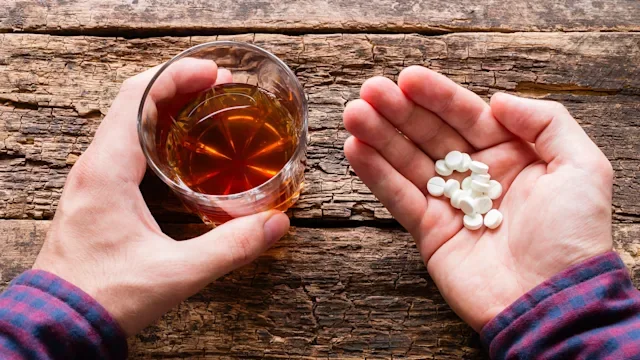Key takeaways:
Alcohol can have a negative effect on sperm count and quality. It can lead to changes in their size, shape, and motility.
Heavy drinking for an extended period of time can decrease male fertility. Moderate alcohol intake is less likely to affect sperm.
In addition to limiting how much alcohol you drink, there are other steps you can take to improve male fertility. These include things like eating foods rich in antioxidants and exercising on a regular basis.
There’s a lot of information out there about how lifestyle affects fertility. But male fertility doesn’t always get as much attention as female fertility. If you and your partner are trying to get pregnant — or if you know you want kids in the future — you may be wondering about the quality of your sperm. And you may be wondering how certain factors like alcohol intake affect your sperm.
So if you’re wondering whether you need to cut back on alcohol, keep reading. We cover how alcohol affects sperm, whether you need to avoid it, and other ways to improve male fertility.
How does alcohol affect sperm?
Alcohol can affect sperm in several different ways by causing damage and inflammation in your body. This may lead to:
Lower total sperm production
Sperm with abnormal size and shape
Sperm with decreased motility, meaning they can’t “swim” as well
Less semen production, which is the fluid that carries the sperm
These factors may make it harder for sperm to fertilize an egg, which makes it more difficult to get pregnant. But how much alcohol you drink matters.
Should men avoid alcohol if trying to get pregnant?
If you and your partner are trying to get pregnant, you don’t need to avoid alcohol completely. Occasional alcohol intake is unlikely to have a significant impact on male fertility. But heavy drinking can make it harder to get pregnant.
So, how much is too much?
Before we dive into the research, let’s review what counts as a standard drink:
1.5 oz of spirits, brandy, or cognac
5 oz of wine
8-10 oz of malt liquor or hard seltzer
12 oz of regular beer
It comes as no surprise that different studies have varying results on how much alcohol is safe versus harmful when it comes to sperm quality. Generally, most studies find that the more you drink, the bigger impact it has on sperm.
What affects sperm count? The most common causes of a low sperm count include certain health conditions, medications, and lifestyle factors.
Alcohol and erectile dysfunction: Learn how alcohol and other foods can increase your risk of erectile dysfunction.
Do you have a varicocele? This common condition can affect male fertility. If this is the case, there are treatment options available.
One large study from Denmark noted that men who drank as little as 3 drinks per week (5 units of alcohol) had decreased sperm count and abnormal shape to their sperm. This effect was much more pronounced in men who consumed roughly 15 drinks per week.
Another much larger study analyzed the results of many different studies. After they pooled the results, researchers found that men who drank more than 4 drinks per week produced less semen. They also had lower levels of sex hormones like testosterone.
A few studies have also looked at actual pregnancy outcomes rather than just sperm quality. One study of couples in China found an association between paternal alcohol consumption and increased risk for birth defects.
Read more like this
Explore these related articles, suggested for readers like you.
Another study found that men who drank more than 10 drinks during the week of conception had an increased risk of miscarriage. But it’s important to keep in mind that many factors influence pregnancy outcomes beyond sperm quality.
How do you know if you have a low sperm count?
A semen analysis test can tell you if you have a low sperm count. And it measures more things than just your sperm count. This test can measure:
How much semen you make
How many of the sperm you make are alive
The shape of your sperm
If your sperm are mobile
It also tests the pH of your semen. A low pH (more acidic) could mean there’s a blockage in the glands that produce semen. A high pH (more basic) may be a sign of an infection.
In order to perform the test, you will provide a semen sample. To do this, you can masturbate and collect the sample in the comfort of your own home. It’s recommended to drop the sample off at the lab within 1 hour of collection. And since there can be normal variations in your semen based on when you collect it, submitting two to three samples makes your results more accurate.
Are there any ways to improve male fertility?
Alcohol isn’t the only lifestyle factor that impacts sperm count. It’s helpful to avoid:
Smoking
Anabolic steroids
Marijuana, especially regular use
Adult drug use, like cocaine or methamphetamine
Male fertility is also affected by stress, exercise, and diet. A well-balanced diet — rich in fiber, whole grains, and antioxidant foods — can help with male fertility.
Examples of beneficial foods include:
Fish and seafood
Fruits and vegetables
Nuts and seeds
Lean meats
Olive oil and canola oil
Try to limit foods high in trans and saturated fats, like:
Red and processed meat
Sweet drinks (like Coca-Cola and iced tea)
Snacks (like cookies and potato chips)
The bottom line
If you’re trying to get pregnant, moderate drinking is unlikely to impact male fertility. So, if you occasionally enjoy a beer or two, you don’t need to worry about it affecting your sperm. But heavier drinking could affect both sperm count and quality — along with other health risks associated with alcohol use. If you find that you’re having trouble getting pregnant, talk to a healthcare professional about a semen analysis test. In general, lifestyle changes that are good for your overall health may also improve fertility.

Why trust our experts?


References
Babakhanzadeh, E., et al. (2020). Some of the factors involved in male infertility: A prospective review. International Journal of General Medicine.
Dhumal, S. S., et al. (2021). Semen pH and its correlation with motility and count - a study in subfertile men. JBRA Assisted Reproduction.
Durairajanayagam, D. (2017). Lifestyle causes of male infertility. Arab Journal of Urology.
Ferramosca, A., et al. (2022). Diet and male fertility: The impact of nutrients and antioxidants on sperm energetic metabolism. International Journal of Molecular Sciences.
Finelli, R., et al. (2022). Impact of alcohol consumption on male fertility potential: A narrative review. International Journal of Environmental Research and Public Health.
Henriksen, T. B., et al. (2004). Alcohol consumption at the time of conception and spontaneous abortion. American Journal of Epidemiology.
Ilacqua, A., et al. (2018). Lifestyle and fertility: the influence of stress and quality of life on male fertility. Reproductive Biology and Endocrinology.
Jensen, T. K., et al. (2014). Habitual alcohol consumption associated with reduced semen quality and changes in reproductive hormones; a cross-sectional study among 1221 young Danish men. The British Medical Journal Open.
Li, Y., et al. (2011). Association between socio-psycho-behavioral factors and male semen quality: Systematic review and meta-analyses. Fertility and Sterility.
National Institute on Alcohol Abuse and Alcoholism. (n.d.). What is a standard drink?
Nguyen-Thanh, T., et al. (2023). Investigating the association between alcohol intake and male reproductive function: A current meta-analysis. Heliyon.
Skoracka, K., et al. (2020). Diet and nutritional factors in male (in)fertility—underestimated factors. Journal of Clinical Medicine.
Sunder, M., et al. (2022). Semen analysis. StatPearls.
Zhou, Q., et al. (2021). Association of preconception paternal alcohol consumption with increased fetal birth defect risk. Journal of the American Medical Association Pediatrics.


















